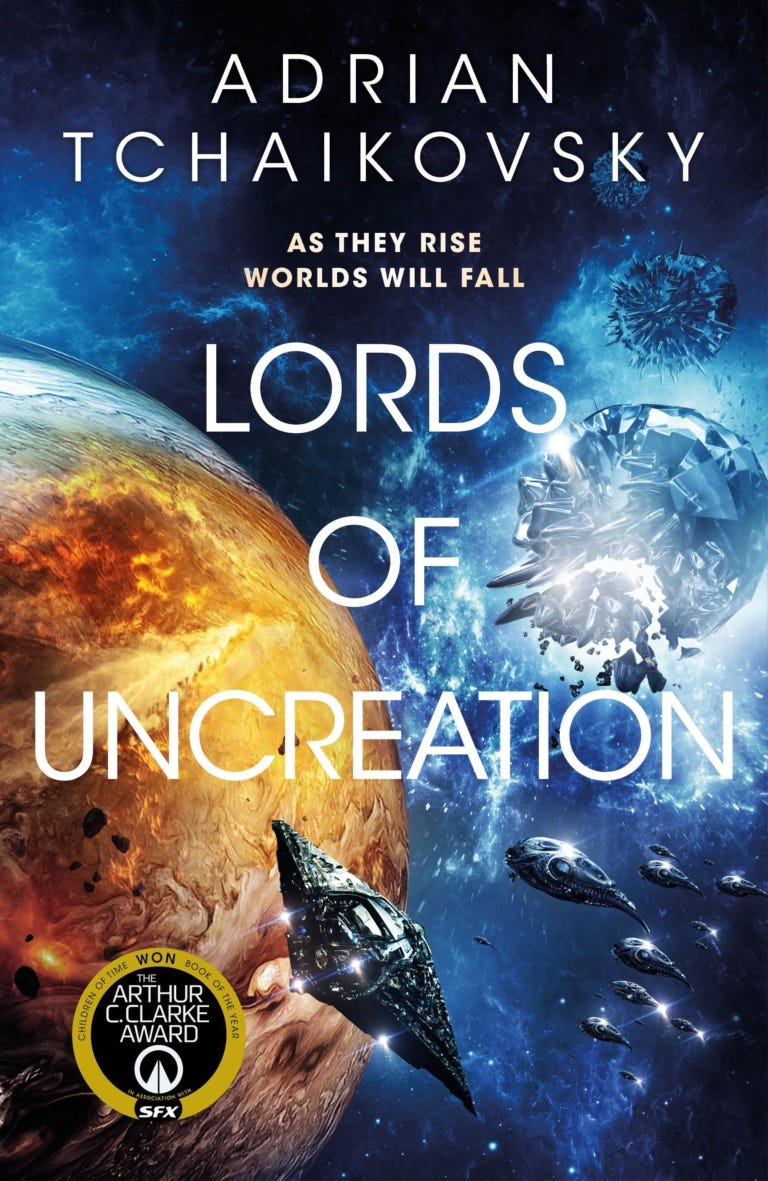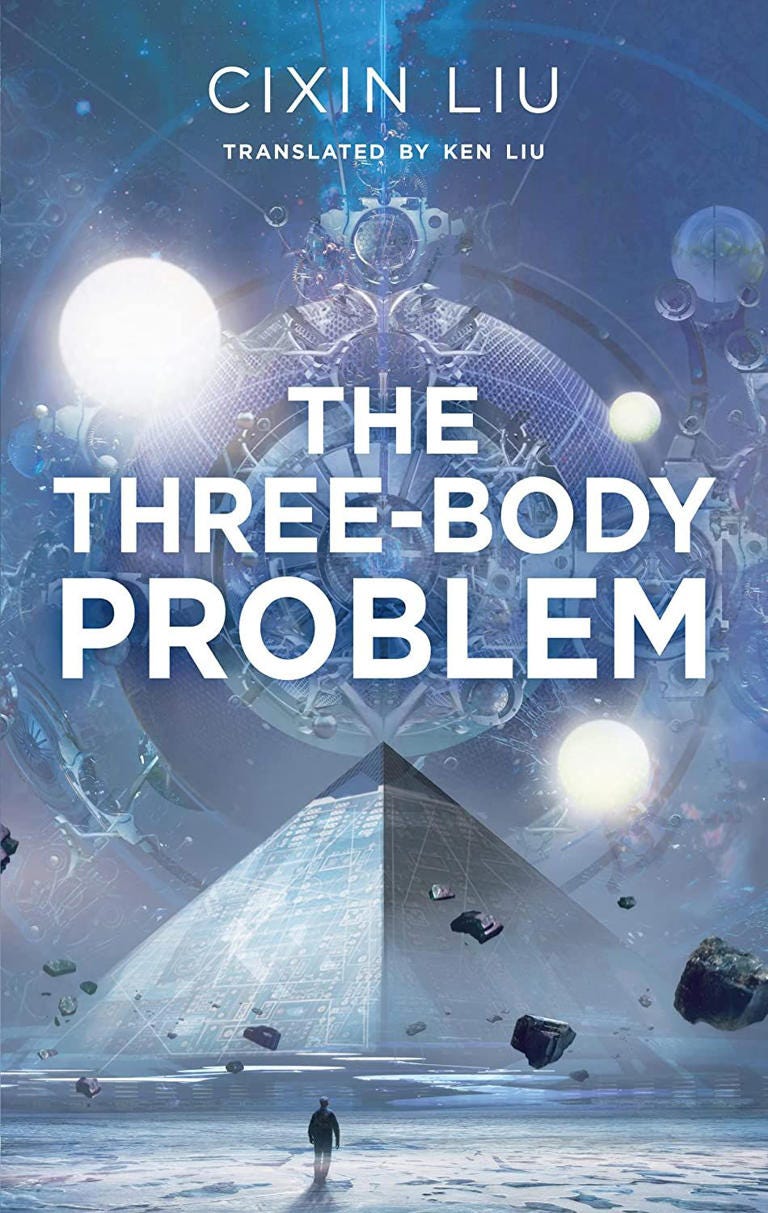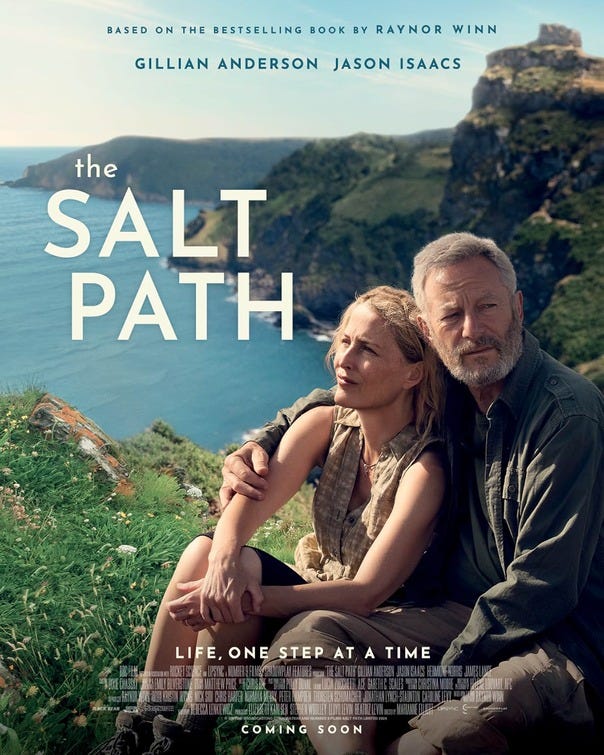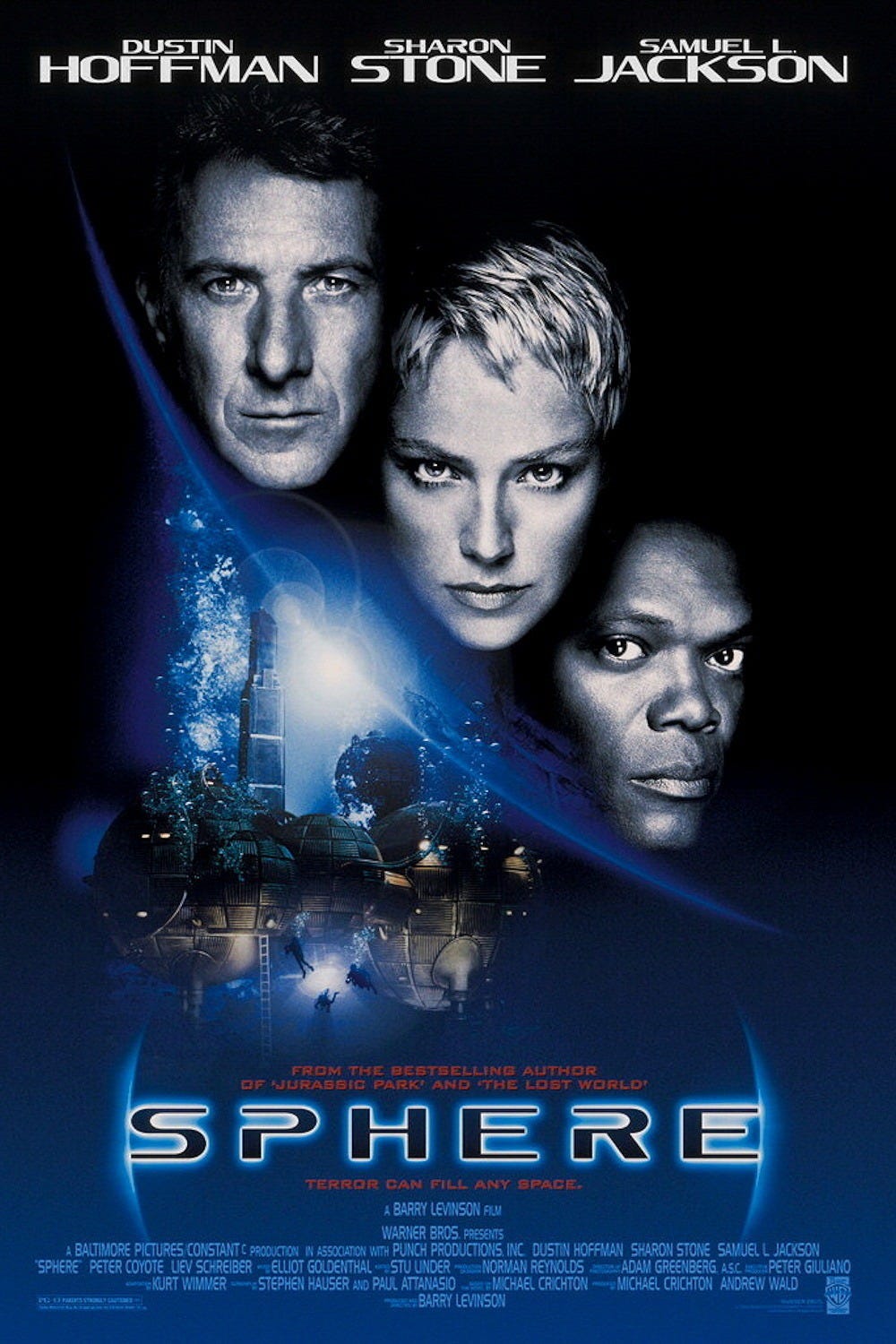An overview of my reading and watching throughout June 2025. There was a lot and this post is “too long for email” so to read the full review, dear reader, you will need to click through to my SubStack proper. Enjoy, I hope you find something that you will also enjoy.
Books Read - 24/52
I read a lot of children’s picture books this month as my daughter is starting to follow along and show interest. The highlights were Within my Branches by Nicholas Michel about the life of an oak tree with incredible illustrations and Hairy Maclary From Donaldson’s Dairy by Lynley Dodd which is a tongue twister about Hairy Maclary from Donaldson’s Dairy going for a walk with his fellow dogs, Hercules Morse as big as a horse, Bottomley Potts covered in spots, Muffin McLay like a bundle of hay, Bitzer Maloney all skinny and bony, and Schnitzel von Krumm with a very low tum, complete with cute drawings of each dog.
On Paper
Lords of Uncreation by Adrian Tchaikovsky
*MINIMAL SPOILERS*
The Final Architecture trilogy is a prime example of series that would have been improved had it been told from third person omniscient rather than third person limited. A great deal of the first and third books is quasi-filler only there to remind the reader about the character the PoV has swapped to, their intentions, mission, location, etc. The second book does this less. Crammed within the third book is an entire political melodrama within the Parthenon that Solace, our Partheni PoV, has no agency in and only serves as the “camera” to see it all through. Then it’s solved, brought up a couple times and then gone. The necessity of the story line is to make good on promises from the first and second books about warring factions within the all-female warrior angels faction but it is limp, too short, and confusing. Were the conspirators influential or not? It isn’t clear. The surviving Partheni fleet is small afterwards but the mutinous ships were able to be commandeered by loyalists all at the same time but it cost most of their ships but only a small number of women. If this plot line was cut out it would have improved the book.
The ending, meaning specifically the final location and final standoff between hero and villain is almost half the book. A state that is made tiresome by the repetitiveness of the narrative, especially the hero Idris Telemmier. Because of the nature of unspace the language is more theoretical than practical, for unspace is a realm of pure thought and at its centre, the centre of the universe, a place of infinite smallness but infinite power over the universe, as Tchaikovsky writes many times, it is where the levers are. The mystery to who the Orignators are, who controls the Architects, why they’re doing, the titular Lords of Uncreation, I found to be satisfying enough. Not unique, Final Fantasy XIV did it before and I’m sure others have too, but it’s also a villain-origin-story I like.
There is a lot that is predictable about all parts of the story but it is also satisfying. If nothing else Tchaikovsky can write a satisfying story from beginning to end even if the actual words amount to twice what they need to.
I read the hardbacks which brings the page count to 1764 with ~300 words a page that is almost 500’000 words. Compared with the unabridged Romance of the Three Kingdoms at roughly 800’000 words, a lot less happens in The Final Architecture. RotK is written in third-person omniscient, like Dune, and covers over 80 years with thousands of named characters and hundreds of them with distinct arcs, many of which overlap. Now there has been some discussion on Twitter and here about how people no longer want third-person omniscient but a lot more happens in RotK and Dune without ever feeling tiring to read or repeating itself than happens in The Final Architecture. Simply put third-person omniscient allows for shorter books with more happening with no loss of investment for the reader.
The Three Body Problem by Liu Cixin
Phenomenal book. Hard science fiction at its best. Unfurls like a beautiful peony. Told non-chronologically and from multiple perspectives yet manages to expertly tie the story together into one meaningful ending. Very much the first book of a trilogy and written as such.
On SubStack
treats us to a sci-fi air battle, of cloned-sibling defenders and barely human invaders fighting it out in a cataclysmic storm playing havoc with the four-man fighter jets, Dragonflies, facing off against a massive air tank and its escort. The fate of Freyan hangs in the balance. Visceral, punchy, heart-wrenching, a short story with depth of feeling and world building. spins a tale of love and feuds, of death and loss. A brilliant story with an unexpected turn. The First Death of Segitars Arpadi is expertly written, absorbing and intimate. crafts a fairytale for the ages. A young woman with nothing to her credit and a lonely magpie have a chance meeting in which will change their fates forever.Find the Blackpage! is a new serial from
. A novice Author searches for a missing legend at the behest of the Blackpage’s arch-nemesis, Targand. but what will he uncover.On PDF
Tlön, Uqbar, Orbis Tertius by Jorges Luis Borges
The secret creation of a fictional planet begins to alter reality here on Earth. A short, 16 page, read. You can read it here. Almost certainly an influence for The Lemurian Time War by CCRU.
The Last Question by Isaac Asimov
There is only one question, how to prevent the entropy of the universe. Plainly written, very short, and somewhat poignant. It isn’t groundbreaking, though it might have been for 1956. You can read it here.
On Film
The Salt Path
My wife, daughter, and I went to see this at our local cinema as they had a baby friendly showing and we ended up being the only ones there. Our 9 month daughter was very good up until the last 30 minutes when she became a bit grouchy from being unable to nap.
The film is very good, set in south-west England, it’s about a couple who lose their home, their livelihood, and all their money and decide to walk the south west coastal path. Based on a true story and book with the same title. Due to it being based on true events it is less a story and more a segment of a longer journey so the ending is a little flat but it doesn’t detract from the rest of the film which is fundamentally about learning to live no matter what life throws at you.
Sphere
*SPOILERS FOR A 27 YEAR OLD FILM*
I love this film. I have not read the book. I may read the book if I come across a copy second-hand. I first saw this with my dad when I was about 10 or so and I was enthralled and I’ve watched it a handful of times since and still like it just as much. The premise is great, the lighting, the physical effects, the minimal CGI, the physical set, etc. Watching “older” films like this really shows how hollow newer films are, how plastic with all the CGI and mocap and botox-face acting.
An alien spaceship has been found on the Pacific Ocean floor and a team consisting of a mathematician, astrophysicist, marine biologist, and psychologist are assembled. to investigate. The ship is thought to have some form of life on board. Once they board the ship they find it is a human ship, specifically American, from the future but crashed 300 years in the past with the last entry being “unknown” but appearing to be a black hole. Aboard the spaceship is a massive golden sphere which when interacted with grants the power to manifest a person’s thoughts, good and bad, conscious and unconscious.
The film isn’t perfect, far from it, but it doesn’t really matter, it’s a good psychological thriller with a terrible psychologist character. Either whoever wrote Norman Goodman (Dustin Hoffman) didn’t have a clue or Hoffman was given poor direction. When he is required to be a psychologist he comes across as an amateur who read a book or two and now thinks he’s a therapist. Though this could be explained by his going into the Sphere and not realising it for almost the entire movie while becoming paranoid and delusional, which brings into question the nature of forgetting. Norman forgets he went in but still has the power to manifest his thoughts.
The ending is also merely fine and I much prefer thinking that they manifest themselves escaping and “forgetting” and are in fact stuck in the mini-sub at the bottom of the ocean rather than escape and actually use the odd power to forget the power and all events. Though it isn’t clear if forgetting would get rid of the power to manifest their imaginations due to Norman forgetting he entered the Sphere but retaining the power, as I mentioned above. The speech Norman gives at the end is atrocious and unnecessary, in it he goes on about how they aren’t ready for this sort of power, how humans are underdeveloped and too emotional to bear the responsibility of the power the Sphere granted them. It’s overdone and adds nothing to the film.
The time travel elements are not well thought through, but then the only film to do time travel well is Primer because all others succumb to either predestination paradox or grandfather paradox or some other temporal Gordian knot. Sphere suffers from predestination paradox; the characters cannot remember because if they remember then the ship containing the Sphere would know what happened to it before arriving on the ocean floor in the 18th century so the characters are forced into a set of actions in order to preserve the future and the past otherwise they would alter time and the spaceship would not have an “unknown entry event” because the characters would have told people but in order for them to experience the ship having an “unknown event” they can’t tell anyone.
Time travel, mess with it at your own peril.
My favourite scene is when all the cupboards are filled with copies of Twenty Thousand Leagues Under the Sea by Jules Verne, the build up to it and the realisation that the books are empty beyond page 87 because Harry can’t read further because he is afraid of squid is brilliant.
Great science-fiction thriller.
Thank you for reading this longer than usual review post.













Happy to hear you enjoyed "The Nominal Dragonfly"! I am looking forward to developing that universe a bit more in the coming months, so stay tuned for more chaos and war.
Hey, I was so glad to hear you enjoyed The Magpie. Thanks for mentioning me. The Salt Path sounds good!